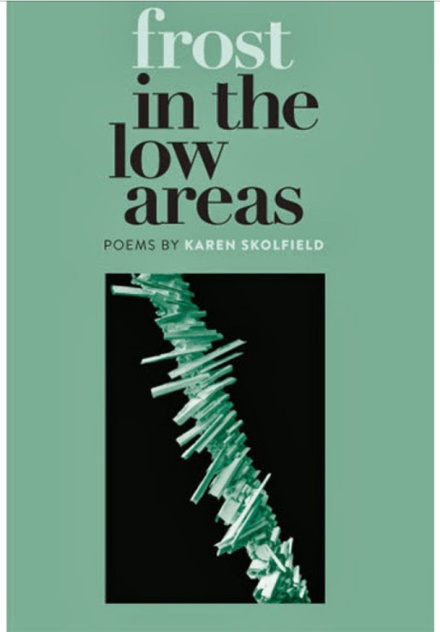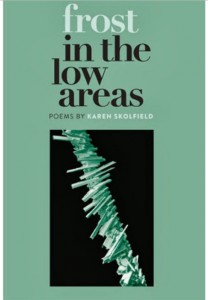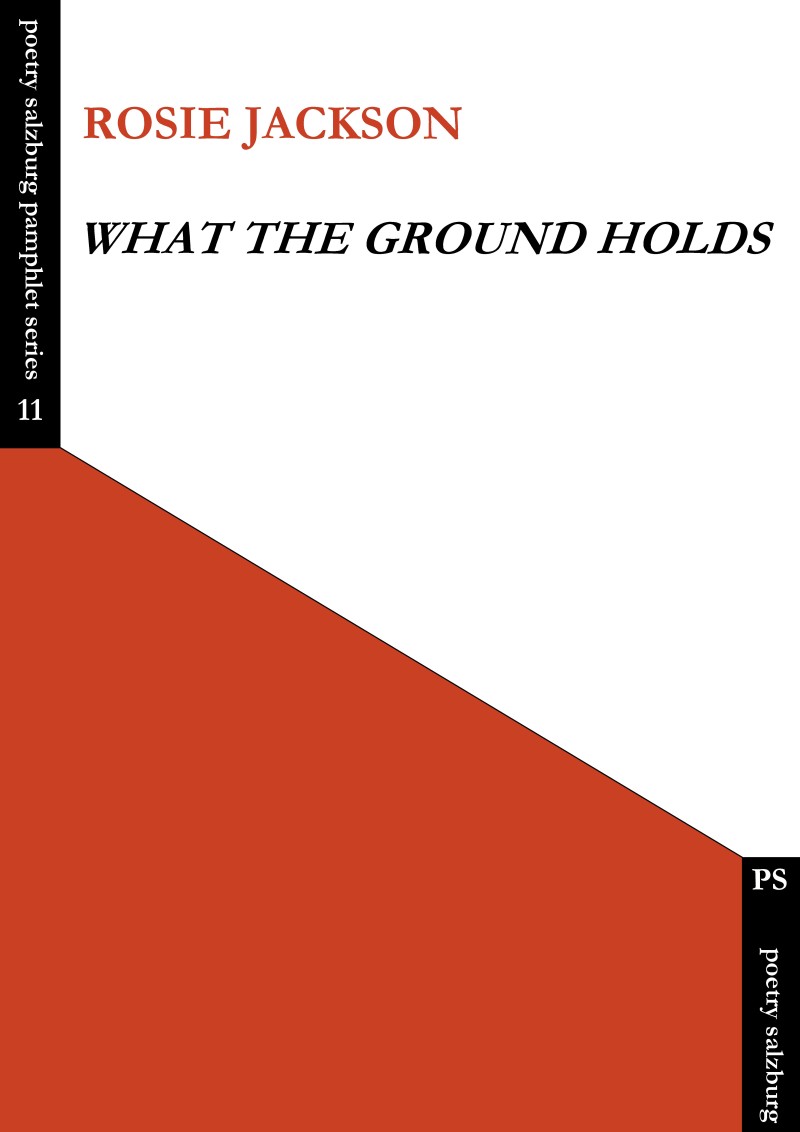Frost in the Low Areas by Karen Skolfield
-Reviewed by Ruth Stacey–
Karen Skolfield’s voice is so present in her poetry I feel like I know her. After carrying her book around with me in my bag for the last few months, dipping in and out in a variety of places and moods, it is the strong sense of her presence that has stood out; always her distinctive voice pondering on the world, her surprising inquisitiveness encased within this immediate, conversational style.
There are so many intriguing and playful lines in the book, for example from ‘Lazurus Species’: ‘Of all the dinosaurs, I miss Spinosaurus the most.’ The curiosity of the poet moves from fossils, pineapples, dead bodies chalked out on the floor, botox clinics, misplaced geographical features, anti-missile guns, the meaning of names.
The book begins with a flash of new life in the poem: ‘Where Babies Come From’:
I thought they were handing me a baby
but it’s a star in my arms, a very small one
just born. Whoever said they twinkle has never
held one
The poem articulates the shock of being given the responsibility of a new life and the marvel of that life. Casually the poem moves from inner thoughts to an attempt to articulate these vast thoughts in a room (a party?) but the others don’t get it:
They’ve turned back to the food, what’s left
of the warm brie. These are not the people
you want between you and the lifeboats.
Such a delicious, ironic tone that made me smile as I read it, in fact there is a lot of humour in this collection, despite the big subjects Skolfield writes about.
The idea the narrator is trying to talk about in this opening poem as she describes constellations is, I think, that we are all made out of stars. Not just a baby in her arms, but a minute part of an entire galaxy. The narrator says, ‘I know it was profound,’ and it is an ambitious, exciting poem told in an almost languid fashion that typifies the entire collection.
Skolfield takes domestic situations and enlarges them, stretches them far away into the philosophical. There is a certain coolness about her tone that has a logical, scientific sense of enquiry. It made me think of the frost in the title, not that the poems lack emotion, rather that the frost is about precise detail and capturing a thought exactly right. Skolfield is thinking deeply about the world and the poems are long; they have a length that reflects the folding tangents of one thought seeping into another. I see it in my mind like a skein of wool unraveling slowly from a spool. Expansive; no short lines or taut, sparse poems, they are given the length and space needed to unfold big ideas.
‘Art Project: Earth’ focuses on a child making a school project. ‘Balloon, then papier mâché,’ it is attached to a fishing line and hung on an old light fitting. The poet’s eye is focused on the description, precise, ‘discolored, an ugly thing.’ But then the narrator soars up and away, imagining people living on this created globe, wondering what they think as they, ‘…spin one direction/ then back again. How the coyotes howl.’
The reader is pulled away from the everyday and placed far above looking down on this creation, this blue and green globe. Skolfield imagines the inhabitants build: ‘…grand places of worship,/ and there is much to worship. Look up’ and although the reader is still seeing this damp, painted paper globe swinging in a domestic setting, we are invited to imagine ourselves on the real thing, looking up into the sky at the wonder of it all. As a reader I cannot help but take the next step of thought, if it is created, by whom? And the inhabitants of the globe don’t think; they don’t realise their world, ‘hangs by a thread.’ This sense of ecological warning is a big topic from where the poem began with glue and paper.
‘Backblast Area Clear’ is a discomforting poem that highlights the post-military experience, when the memory of army training doesn’t sit so easily in the civilian world. Often within these poems the narrator is both inside/outside; moving from a domestic viewpoint, which allows a tender view of the family and then a wider, more philosophical/political thought within the same poem.
The collection seems to circle around family life and mortality. The first poem in section two, ‘Rumors Of Her Death Have Been Greatly Exaggerated’ uses three line stanzas. In contrast to the majority of the poems that are long and dense, the space created in this poem really emphasises the innocence of the child wanting reassurance about death and the mother’s thoughts of what death can really mean: claymore mines, broken bodies, missing children. The white space felt like her mind grasping for answers. For distraction she tries to get him to look at stars and I found this a powerful echo of the opening poem.
The final poem of the book, ‘Frost In The Low Areas’ also utilises three line stanzas and seems to take a pause, a breath compared to the rush and flow of ideas in the longer poems. Once again, the subject is family life and mortality.
The health survey said
he would live to 76 and I, 86.
Something to do with men’shearts on their worn old grapevines.
Something to do with their will
to lay down and die. In the westerns,how glad they were to give their lives
away
Within this poem there is everything I really enjoyed about this collection: the strong conversational voice, the pondering curiosity, the wry humour and love, the startling thoughts hidden inside everyday situations. Despite the poem being about death it ends with hope, a trustfulness that permeates the whole collection. The last lines read: ‘Before us, / the first crisp morning.’ There is an awareness of time passing in this collection, that you can’t stop that eventual death, but there is a sense that mortality has been reflected on and dealt with, that the poet is okay with it.






